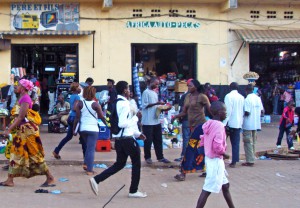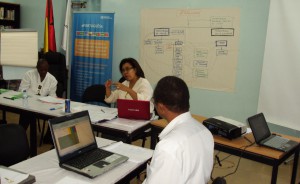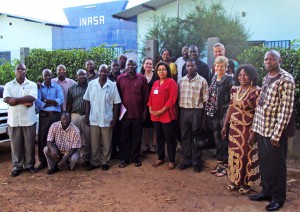Guinea-Bissau: an evolving research system for better health
While in the midst of political upheavals, Guinea Bissau believes that national research system strengthening is a value for development. 
Guinea Bissau is the third poorest country in the world. 85% of the population lives with less than a dollar a day and only 14% of the population speaks the official language (Portuguese). Notwithstanding, Guinea Bissau counts with more than 30 years of research conducted in the country. Such research activity has translated in an impressive contribution to knowledge advancement, including more than 650 publications in international scientific journals. Admittedly, while such research has been relevant for international public health; the use of research results within Guinea-Bissau remains very limited if not null. These 30 years of research practice in Guinea-Bissau have led to the emergence of a health research system highly dependent on international partners both in terms of research priorities and funding.
To date, the main challenges for Guinea-Bissau are the limited local research capacity and the continued dependency on foreign resources. Donors and international agencies can contribute to the process of aligning the research system towards national needs and priorities by coordinating their efforts, aligning their investments to national priorities, and considering findings from local research in their own actions.
Moving forward
If the aim of research is to contribute to better action for health through local decision-making, it is essential to set national research priorities, align funding, build local research capacity and link research to decision-making processes.
In an effort to support research development in the country, the Ministry of Health (with the support of the International Association of National Public Health Institutes) established in 2010 the National Public Health Institute (INASA). This governmental body aims to play a decisive role in national research governance, management and coordination, while ensuring a fluid interaction with the Ministry of Health.
A fruitful collaboration between the Ministry of Health of Guinea Bissau and COHRED started in 2006, with an explicit request to COHRED for guidance and technical support towards the development of a national research system for health more responsive to the country needs. In this regard the National Institute of Public Health has initiated since its inception concrete actions to strengthen the national research system in Guinea Bissau. These actions include the definition of a national research agenda, the development of a national research policy, as well as the set up of a research management information system. Developing these system aspects is a key step towards a better alignment of research with national needs, and the promotion of investment into those needs.  Health Research Priority Setting Workshop held in INASA in November 2011, facilitated by COHRED and financially supported by WAHO and IDRC. On the back wall, a draft map of the National Research System for Health.
Health Research Priority Setting Workshop held in INASA in November 2011, facilitated by COHRED and financially supported by WAHO and IDRC. On the back wall, a draft map of the National Research System for Health.
Recent progresses
Following a momentary interruption of activities in 2012 due to the military push in the country, a national workshop for validation of priorities in research for health was organised by INASA in May 2013. The workshop allowed the review and confirmation of the final list of national priorities in research for health, which were defined through a national consultation held in October 2011. These priorities will constitute the core of a national research for health agenda to be submitted to the Minister of Health for adoption in June 2013, and will hopefully become the first national research for health agenda ever issued and supported in Guinea Bissau.
The West Africa project has helped to create momentum in Guinea Bissau and achieve some objectives towards the strengthening of the country’s research system for health. Though these achievements may seem modest, they represent significant steps in a context of very high political instability and scarce resources.  Participants of the Health Research Priority Setting Workshop held in INASA in November 2011, facilitated by COHRED and financially supported by WAHO and IDRC.
Participants of the Health Research Priority Setting Workshop held in INASA in November 2011, facilitated by COHRED and financially supported by WAHO and IDRC.
Source: The emergence and current performance of a health research system: lessons from Guinea Bissau, Maarten O Kok,Amabelia Rodrigues, Augusto Paulo Silva, Sylvia de Haan, Health Research Policy and Systems 2012, 10:5
